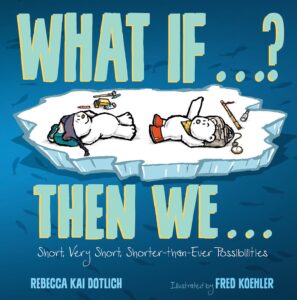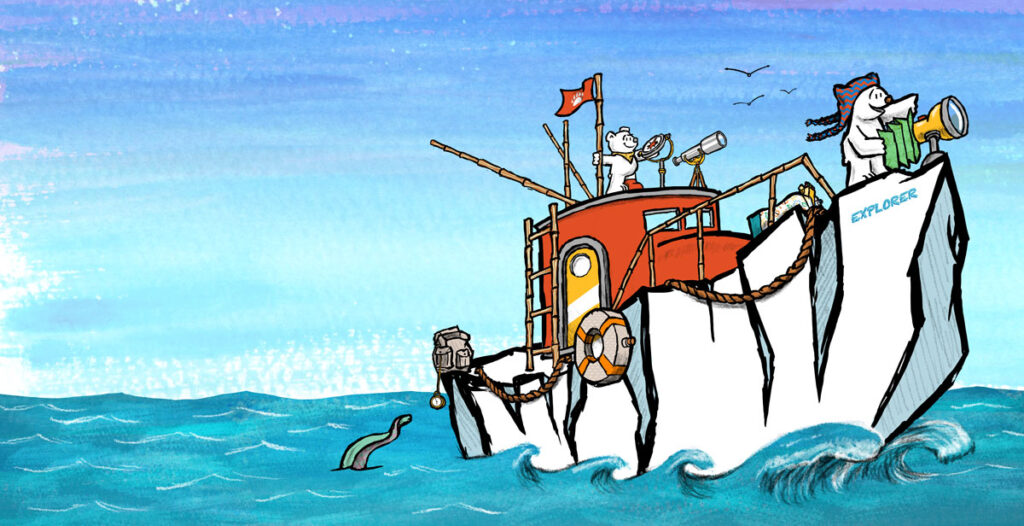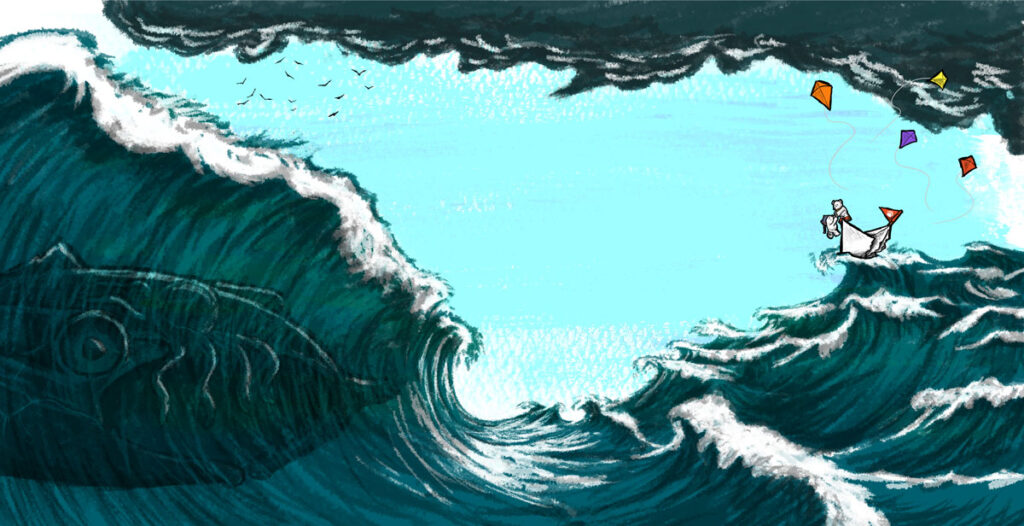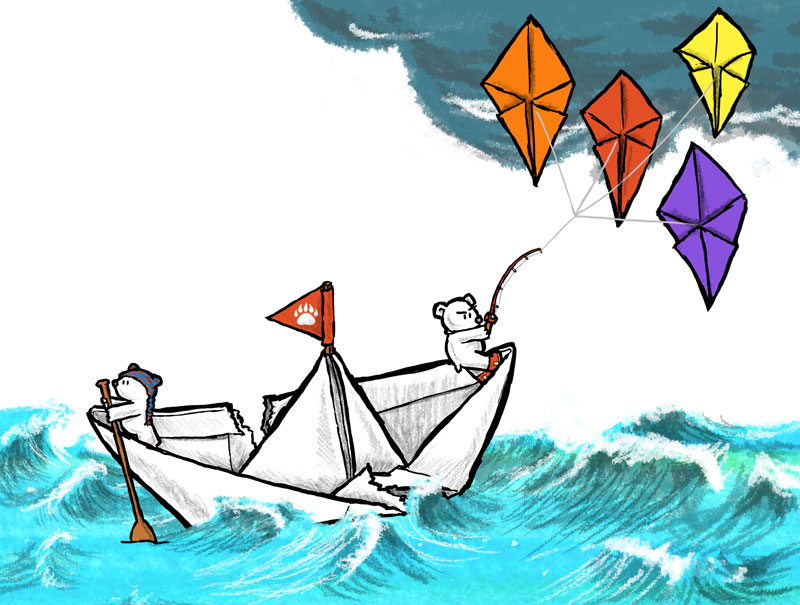I’ve been running OPB since April 2018, and to date, we’ve only had one repeat interview subject so far—Rob Sanders. It’s time to do another one right now with someone who’s got a lot of new things to talk about. Welcome back to author/illustrator Fred Koehler!
He’s already got a great bio on his website, so instead of trying to reinvent the biographical wheel, I’ll just share it below in full.
Fred Koehler is an artist and storyteller whose real-life misadventures include sunken boats, shark encounters, and hurricanes. Whether free diving in the Gulf of Mexico or backpacking across Africa, Fred’s sense of adventure and awe of nature overflow into his characters’ stories.
Fred is passionate about encouraging young artists, promoting social justice, and conserving our environment. He lives in Florida with his wife, kids, and a rescue dog named Cheerio Mutt-Face McChubbybutt.
Now if you want the basic questions and early-career stuff re: Fred beyond this, visit the other interview.
This one’s going to pick right up with what’s been doing lately, including the very cool Big Project he’s running now. Let’s find out more!
RVC: Since our last chat, you’ve illustrated another cool picture book written by Rebecca Kai Dotlich. Tell me about the book!
[cover image] FK: First of all, RKD is one of my favorite human beings on planet earth. She saw a way to take the spirit of One Day The End, (which won us a Boston Globe Horn Book Honor), and create a new narrative about friendship titled What If, Then We. In this story, a pair of polar bear best friends ask each other ‘what if’ questions that lead them on a super fun adventure of the imagination.
FK: First of all, RKD is one of my favorite human beings on planet earth. She saw a way to take the spirit of One Day The End, (which won us a Boston Globe Horn Book Honor), and create a new narrative about friendship titled What If, Then We. In this story, a pair of polar bear best friends ask each other ‘what if’ questions that lead them on a super fun adventure of the imagination.
RVC: What’s your favorite illustration in that book?
FK: Back around 2010, I was in a boating accident and probably shouldn’t have made it. But ever since then, sinking ships have sneakily found their way into a lot of my art and stories. (I’m sure Freud would have something to say about this.)
RVC: I’ll bet. WOW!
FK: What If, Then We has not one but TWO sinking ships. Here are two of my favorite spreads: one showing the joy of a new adventure and one showing the moment all hope seems lost for our friends. (Spoiler alert: they come out okay in the end.)


RVC: Your illustrations are known for their vibrant energy and expressive characters. Where do you draw inspiration for your visual style, and how do you approach the process of bringing your characters to life?
FK: I’m proud to say I was inspired by the masters–Leonardo, Michelangelo, Donatello, Rafael. Oh, and don’t forget Splinter, Darkwing Duck, Calvin and Hobbes, and every cell-animated Disney movie from the mid 80s onward. Honestly, I watched a lot of cartoons and read the Sunday comics religiously.
RVC: This probably explains why we get along so well.
FK: In my 20s and 30s, I taught myself to draw. My approach has evolved, but I’ve always seen an illustration as having to help a viewer imagine the answer to two questions: “What led to this moment?” and “What’s going to happen next?”

Here’s an example from What If, Then We. We’ve got a clear conflict between the characters with each of them trying to take the boat in a different direction. We see the beginning of a storm with clouds forming, waves rising, and even the paper boat starting to rip. What led to this moment? We can guess it was some sort of disagreement. What happens next? Turn the page and find out.
RVC: Love it–thanks for sharing the visuals to help explain things. Now, you’re working on more kidlit books for older readers now, is that right? Do you see your career moving more in that realm, or will we continue to see Fred authored and/or illustrated picture books going forward?
FK: Novels were always my first love, and I’m thrilled to be working on several illustrated novels at the moment, including one about a boy with an unsinkable boat (go figure) who is lost at sea. At the end of the day, I’m just a nerd who sees story in everything. I’ll partner with anyone who can help get those stories out into the world, and that includes every medium from picture books to motion pictures.
RVC: What’s your favorite part of making a new picture book?
 FK: There’s nothing quite like when a reader ‘gets it.’ The book is done. It’s out in the world. And someone, somewhere, finds deeper meaning than just the words and pictures. Maybe it’s a kid who lives for a specific page turn (like I always did with There’s a Monster at the End of this Book.) Or it could be a parent who felt their heart lighten just a teeny bit after reading How to Cheer Up Dad. I live for those moments where I become part of a reader’s story.
FK: There’s nothing quite like when a reader ‘gets it.’ The book is done. It’s out in the world. And someone, somewhere, finds deeper meaning than just the words and pictures. Maybe it’s a kid who lives for a specific page turn (like I always did with There’s a Monster at the End of this Book.) Or it could be a parent who felt their heart lighten just a teeny bit after reading How to Cheer Up Dad. I live for those moments where I become part of a reader’s story.
RVC: You mentioned the importance of community in your previous interview. How have you continued to nurture your creative community, and what advice do you have for those seeking to build their own?
FK: I’m not gonna lie. Community is no easy thing for introverts. But it’s an absolute necessity. I tend to keep a tight-knit group of creative friends who have the same passion and fire inside of them, even if we’re all in different stages of different journeys. The fire is the important part. I have writing friends that I might not talk to for a year, only to reconnect like it was yesterday because we’ve each been off creating and discovering–then get to simply enjoy the opportunity to swap stories.
RVC: Since we’re talking about community, let’s now talk about the Big Project you’re involved with. What’s Ready Chapter 1?
FK: If you’re a writer (like most everyone reading this), RC1 is the world’s first (and biggest) online critique group where we bring in editors and agents to review our top performing stories. If you’re a publisher, it’s a goldmine of undiscovered writers and brilliant manuscripts backed by community analytics. Together, it becomes a place where writers can swap critiques, level up their work, and find legitimate publishing opportunities.
RVC: What inspired you to create Ready Chapter 1? Was there a specific experience or gap in the market that you wanted to address?
FK: This was a pandemic project that has really blown up. When our in-person writers group had to shut down, we reached out to hundreds of writers to ask them what they needed most and the answer was twofold: Education and Opportunity. Basically, can you help us become better writers? And, oh by the way, can you also help us connect with publishers once our writing is market-ready? That’s the mission behind everything we do.
RVC: How does Ready Chapter 1 differ from other writing communities and platforms available to aspiring authors?
FK: Essentially, we’re like a great big critique group full of strangers. Want to post your work? Give other writers feedback first. Want to get your work in front of an agent or editor? Post enough of your story (about five chapters) so that we can get a good measure of the community reaction. We run a new mini contest every month with a guest agent judging the finalists. We run longer challenges in partnership with publishers seeking new authors.
Publishers love what we’re doing because we’re connecting them with the best of the best writers on our site, along with a report outlining those aggregate community reactions. Throw in some live and recorded classes and you end up with all the best parts of a critique group, a writers conference, and an MFA program where you actually have a shot at achieving your publishing dream.
RVC: While Ready Chapter 1 doesn’t promise representation or publishing deals, how does it help writers increase their chances of success in the competitive publishing world?
FK: Here’s the new normal in publishing: If I’m an editor, I’m so overwhelmed with current projects and new submissions that I’m even ghosting the agents. To break in today, you need a well-polished manuscript along with a strong pitch and a query letter that checks all the boxes. RC1’s superpower is that process of polishing your work. Test your story in the forums. Iterate based on community feedback. Make friends. Win a few contests. Send out a manuscript that’s so good it can’t be ignored.
RVC: What kind of learning tools and resources do you offer to help writers grow in their craft and understand the publishing industry?
FK: Maybe this is revealing a bit of our secret sauce but… we’ve spoken with so many gatekeepers over the years and built a list of the most critical elements of storytelling craft. The stuff that makes the difference between a four-and-a-half star story and a five star bestseller. We built a masterclass series called Total Story Accelerator based on those elements of craft. From concept to query, each class dovetails into the next and gives you every handout and worksheet you’ll need to apply the lessons to each new story you write. (While it’s focused on novels, many of the lessons apply to picture books too. 🙂 )
RVC: How do you select the industry experts who participate in your events and masterclasses?
FK: Because the goal is to see as many of our members as possible get published, we look for agents and editors who are currently open to submissions (or will open a window for our users). But because we’re also feedback driven, we narrow our scope even further to those who have a reputation for giving great advice. I like to think of them as story whisperers who see the seed of what’s brilliant in a manuscript and can give the perfect piece of advice to help an author flourish.
RVC: The Peer Critique Forum seems to be a core component of Ready Chapter 1. How do you ensure the quality and effectiveness of the feedback exchanged within the community?
FK: Culture is a huge component of RC1, the same as with a traditional critique group. We have a flagging system for bad actors, but it honestly isn’t used very often. If folks give us a try and realize they don’t really want to contribute to the growth and development of their fellow writers, they won’t stick around. Our most successful writers are also some of the best at giving critique.
RVC: One last question for this part of the interview. What’s your vision for the future of Ready Chapter 1? Are there any new features or services you’re planning to introduce?
FK: Okay. I’ll say it here publicly for the first time. Every indication is pointing us toward the creation of a new kind of marketplace for stories. Imagine if, as a writer, all you had to do was write something brilliant, get it vetted by our community, and then have it offered for licensing deals to publishers hungry for new content? It would be a win/win for content creators and content buyers. We’re looking for the right partner to help us bring this concept to fruition and we’re getting closer and closer to finding them.

Oh yeah, and we also want to do a podcast where we get permission from the authors to read the best Chapter 1’s on our entire site. Because who wouldn’t want to listen to chapter 1 of a new book every week? 🙂
RVC: Okay, Fred. It’s time for the LIGHTNING ROUND. Zip-zappy questions followed by zippity-zoom answers please. Ready?
FK: Yes. No. Maybe. Crap! Okay, just go!
RVC: Favorite way to procrastinate when you should be working on a project?
FK: Currently–online searches for a mint condition Honda Element to turn into an overland adventure mobile.
RVC: The most ridiculous thing you’ve ever done in the name of research for a book?
FK: I took two broomsticks and the rain cover for a tent to see if I could sail my kayak on the open ocean. Oh wait, there’s a video.
RVC: If you could only use three colors for the rest of your career, what would they be?
FK: Black, yellow, and red.
RVC: Five words that go hand-in-hand with a “good” story?
FK: Unexpected. Poetic. Haunting. “Fart joke.”
RVC: What’s the one thing you wish you could change about the publishing industry?
FK: Creating a meritocracy where anyone with talent and grit can succeed. PS–workin’ on it.
RVC: One word to describe the ideal Ready Chapter 1 member?
FK: Unsinkable.
RVC: Thanks so much, Fred. Best of luck to you and Ready Chapter 1!

